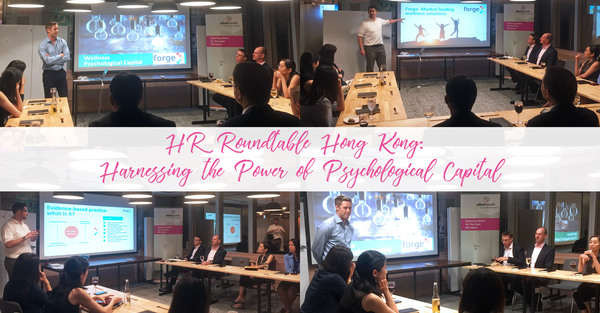Drop off your CV
We serve the global HR community through our offices located in Delhi, Hong Kong, London, New York, São Paulo and Singapore and have placed HR leaders in over 30 countries.
Last month Elliott Scott HR Hong Kong held a roundtable event with senior HR leaders in part...

Last month Elliott Scott HR Hong Kong held a roundtable event with senior HR leaders in partnership with Forge, who deliver market leading wellness solutions, looking at ‘Harnessing the Power of Psychological Capital’.
Following an introduction from Stuart Elliott, CEO and Owner, Elliott Scott HR, Nick Anderson, Partner, Forge, delivered an engaging discussion on psychological wellness in the workplace. Nick kicked off by posing two questions: “Where does the responsibility of wellness sit in the business and who is responsible for the budget?”. The reality is that there is often a lack of ownership when it comes to wellness, which limits the impact businesses have in this space. Is Wellness a fad, a trend? Where should we be investing and spending our money? Nick asked participants to review where wellness sits in their HR structures, moving onto why wellness in the workplace matters, the importance of using evidence-based practice in health, and breaking common misconceptions around ‘wellness’.
The key points from the session were:
The business case for psychological wellness
We have accepted stress as the norm. We used to talk about people bringing their stress to work due to events in their personal lives: financial issues, familial issues, big life events. Now work is the leading cause of stress worldwide. It is estimated that 30% of people in the year ahead will have some form of mental health issues, and will experience a degree of distress. In terms of cost the American Institute of Stress estimated the associated cost to be $300 billion in the USA and £20 billion for the EU. This is seen indirectly through accidents, absenteeism, employee turnover, productivity, as well as directly from medical, legal and insurance costs.
The company’s role The role of culture.
The participants discussed the nature of work in Hong Kong - long hours with evening calls and late nights. When stress levels are high, people work even harder and even longer hours. Additionally the topic of mental wellness is not something that is openly talked about in Hong Kong, making it difficult for companies to address.
The participants discussed how mental wellness conversations differ in different countries and questioned if we are behind in Hong Kong. Wellness is different for each person. The stresses a person feels are very different based on their situation. This means solutions aren’t straightforward.
Businesses prioritize financial success.
This can lead to short term focus on what companies can get out of an individual. Because wellness impacts the long term it seems like a luxury that can wait till later. Common misconceptions around psychological wellness Nick highlighted that often organisations implement programs that are trending, without looking at the research. For example Corporate Wellness Programs (yoga, cycling, healthy habits, biometric screening) They do offer individual improvements, however, a randomized control trial found no fewer sick days, hospital visits, or reduced healthcare costs, and people were no more likely to get a pay rise, get promoted, or to stay in their job (National Bureau of Economic Research).
The role of stigma is very hard to overcome. It is a factor, but research suggests, though we spend most of money on stigma, this might not be the most effective use of the budget. What does the evidence say we should focus on? Companies have limited budgets for wellness, so it is important for investment in wellness to be made in the right areas. Companies should prioritize removing structural barriers to mental health care ensuring employees have access to timely and acceptable care. Additionally, companies should concentrate on building psychological capital in the workplace. This means fostering and developing an individual’s feeling of meaning/ purpose, hope, optimism, resilience and confidence. The discussion on mental health in the workplace is essential and is far from over. It is important for businesses to continue this discussion, there is no simple answer on HOW to tackle mental health problems, and how to best support mental health in the workforce. However, through conversation, research and sharing hopefully companies will move in the right direction.
The evening closed with further networking over drinks and canapés where the guests mingled with the Elliott Scott HR team. If you would be interested in attending any of Elliott Scott HR’s future events, follow us on LinkedIn and keep an eye on our events page.